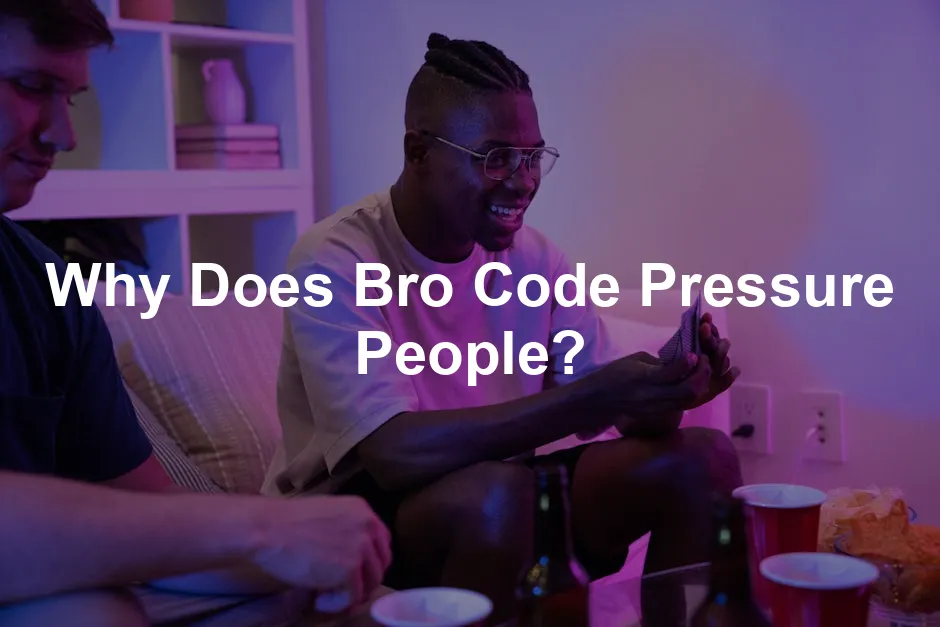
Why Does Bro Code Pressure People?
Introduction
The “Bro Code” refers to an unwritten set of rules guiding male friendships. It suggests that loyalty among men often takes precedence over other relationships. This dynamic can create significant social pressure, compelling individuals to act in ways that may conflict with their values. Ultimately, this pressure shapes behaviors and impacts relationships, leading to ethical dilemmas and emotional struggles.
Summary and Overview
The concept of Bro Code has roots in male socialization, evolving over time from simple guidelines to complex social norms. Historically, it emphasized loyalty and camaraderie among men. In today’s society, this code remains relevant, influencing how men interact with one another and with women. However, it presents a duality: while it can strengthen bonds, it also creates ethical dilemmas.
In the following sections, we will examine the nature of Bro Code, its psychological impacts, and its positive and negative consequences. We’ll explore how it reinforces toxic behaviors and affects mental health. Finally, we’ll discuss evolving perspectives on the Bro Code and how society is challenging these traditional notions.
Understanding the impact of Bro Code on emotional well-being is essential. Why understanding emotional responses is crucial for mental health

The Nature of Bro Code
What is Bro Code?
The Bro Code is an informal agreement among men, often encapsulated in phrases like “Bros before hoes.” It emphasizes loyalty, camaraderie, and protection among friends. Boys are socialized into this code from a young age, learning its rules through interactions in games, sports, and media.
Popular culture, including shows like How I Met Your Mother and movies featuring male friendships, has helped shape its perception. The Bro Code often fosters a sense of accountability among friends. However, it can also lead to a reluctance to confront unethical behavior, as loyalty is prioritized over ethical considerations.
If you want to dive deeper into the world of male friendships, consider checking out How I Met Your Mother: The Complete Series DVD. It’s a hilarious exploration of friendships that might just make you rethink your own code!

The Psychological Impact of Bro Code
The Bro Code exerts strong psychological pressure on men. This unwritten code often demands loyalty, which can conflict with personal values. Many men feel an obligation to prioritize their friendships over other relationships. This sense of loyalty can lead to unhealthy behaviors, such as covering for friends in morally questionable situations.
Masculinity plays a central role in how men perceive the Bro Code. Society often teaches men that expressing vulnerability is a sign of weakness. As a result, many adhere to rigid masculine norms, avoiding emotional expression to maintain their status among peers. This can create a toxic cycle where feelings of isolation and stress build up.
Competition among friends can also heighten this pressure. The need to appear strong or successful may lead men to engage in risky behaviors. They may feel they must prove their worth through reckless actions, especially in group settings. This competitive atmosphere can be damaging, as it discourages open discussions about feelings or mental health.
Strong friendships are essential for mental health, which is why investing in your well-being is key. A great way to do that is by checking out a Men’s Health Magazine Subscription. Stay updated on health trends, fitness tips, and more to help you navigate your friendships and life!
Statistics reveal the impact of male friendships on mental health. Research shows that men often struggle to form deep emotional connections. A study found that nearly 40% of men report feeling lonely. This loneliness can stem from the pressure to conform to the Bro Code, preventing men from seeking support when they need it most.
Overall, while the Bro Code aims to foster camaraderie, it often brings significant psychological burdens. Understanding these pressures is crucial for promoting healthier friendships and encouraging men to embrace vulnerability.

Negative Consequences of Bro Code
Reinforcing Toxic Behaviors
The Bro Code often encourages men to cover for each other, even when their actions are unethical. This can create a culture of silence, where harmful behaviors go unchecked. For instance, a friend might choose to ignore or downplay instances of harassment, simply to protect a buddy’s reputation. This blind loyalty can contribute to a toxic environment, where accountability is lacking.
Misogyny and objectification can also stem from the Bro Code. Many men are socialized to view women as prizes or possessions, rather than individuals with autonomy. Phrases like “bros before hoes” reinforce this mindset, suggesting that male friendships are more important than respecting women. Statistics show that this culture can have dire consequences. According to a study, nearly 1 in 5 women experience sexual assault during their college years, often influenced by the attitudes perpetuated within male peer groups.
This objectification not only harms women but also perpetuates harmful stereotypes about men. When men prioritize loyalty to their friends over ethical behavior, they contribute to a cycle of disrespect and violence. The Bro Code, while often seen as a lighthearted set of rules, can lead to serious consequences for both genders.
To counteract these negative aspects, consider investing in your understanding of respect and relationships with A Gentleman’s Guide to Etiquette Book. It’s an enlightening read that can reshape your perspective on friendships!

Mental Health Implications
Adhering to the Bro Code can take a toll on men’s mental health. The pressure to conform to rigid masculine norms often leads to feelings of isolation and stress. Many men feel they must sacrifice their own values to maintain friendships. This can discourage them from seeking help when they need it, further exacerbating feelings of loneliness.
A significant number of men report struggling with mental health issues linked to societal expectations. Research indicates that men are less likely to seek help for depression or anxiety, often due to fear of being perceived as weak. This reluctance can lead to a cycle of untreated mental health problems, affecting their overall well-being.
Moreover, the competitive atmosphere fostered by the Bro Code can lead to unhealthy behaviors. Men may turn to substance abuse or engage in risky activities to prove their worth. This not only harms their health but also affects their relationships. The pressure to conform can create a façade of strength, masking underlying emotional struggles that need attention.
For those looking to enhance their mental wellness, consider diving into The Mindful Way Through Depression Book. It offers valuable insights into managing mental health challenges and fostering emotional resilience.

The Dilemma of Loyalty vs. Ethics
The Bro Code often places men in challenging situations where loyalty to a friend conflicts with moral or ethical behavior. Imagine a scenario where a friend is cheating in a relationship. Should you confront him, risking the friendship, or stay silent, condoning the behavior? This dilemma can lead to internal conflict and stress.
Real-life examples abound in media where the Bro Code is tested. Notable cases, like scandals among celebrities, highlight how loyalty can lead to public fallout. These situations remind us that the implications of the Bro Code extend beyond personal relationships, impacting society as a whole.
The consequences of prioritizing loyalty over ethics can be significant. Friendships may suffer, and trust can be eroded. When men choose silence over accountability, they perpetuate a culture that accepts unethical behavior. Challenging these norms is essential for fostering healthier relationships and promoting respect among friends.
In conclusion, while the Bro Code may seem harmless, its negative consequences are far-reaching. From reinforcing toxic behaviors to impacting mental health and creating ethical dilemmas, the pressure to conform can lead to serious implications. It’s crucial for men to reflect on these dynamics and consider the broader impact of their actions on themselves and others.

Evolving Perspectives on Bro Code
How Society is Challenging Bro Code
In recent years, society’s views on masculinity and friendship have shifted remarkably. Men are increasingly questioning the rigid expectations set by the Bro Code, seeking healthier dynamics in their relationships. Movements like #MeToo have sparked essential discussions about consent and respect, pushing men to reconsider what loyalty truly means.
These conversations challenge the traditional notions of blind loyalty, encouraging men to prioritize ethical behavior over following outdated codes. For instance, many men now advocate for accountability, standing up against harmful actions instead of covering them up. They recognize that true friendship includes honesty and respect, not just loyalty at all costs.
Prominent figures and influencers are actively calling out behaviors that perpetuate toxic masculinity. They highlight the importance of supporting one another in making ethical choices, even if it means confronting a friend. This shift illustrates a broader cultural movement towards redefining masculinity and fostering more meaningful connections.

The Role of Women in Disrupting Bro Code
Women play a crucial role in reshaping the dynamics of the Bro Code. Their perspectives encourage men to think critically about the implications of their actions. Interestingly, there’s often no equivalent “girl code,” which highlights the unique socialization of women. This absence means women frequently advocate for open dialogue and accountability within relationships.
Many women have called out Bro Code behaviors, emphasizing that mutual respect is essential. For example, when men refuse to support their friends’ unethical actions, they help break the cycle of silence. Women’s voices challenge the idea that loyalty must come at the expense of integrity, pushing for a more inclusive understanding of friendship.
This shift not only empowers women but also allows men to express vulnerability and empathy. As more men engage in these conversations, they foster an environment where ethical behavior supersedes outdated codes. Women’s influence is vital in promoting healthier friendships and dismantling the toxic aspects of the Bro Code.

Breaking the Bro Code: When is it Necessary?
Situations that Demand Breaking the Code
There are moments when breaking the Bro Code becomes essential. When a friend’s actions might harm others or themselves, choosing ethics over loyalty is crucial. For instance, if a friend is involved in abusive behavior, it’s vital to speak up. Protecting someone from harm should always take precedence over blind loyalty.
Challenging the Bro Code can also lead to personal growth. Many men have shared testimonials about the transformative experiences of standing up for what’s right. They found that confronting difficult situations often strengthened their relationships. It opened doors to deeper, more authentic connections based on mutual respect.
Quotes from individuals emphasize this point: “Breaking the code taught me that true friends hold each other accountable.” Such experiences illustrate that bending or breaking the Bro Code can sometimes lead to better outcomes for everyone involved. Ultimately, prioritizing ethics helps build stronger, more resilient friendships.

Strategies for Healthy Friendships
Navigating friendships without relying on the Bro Code can lead to stronger, more fulfilling connections. Here are some tips to foster healthier male friendships.
First, prioritize open communication. Regularly check in with your friends about how they feel. Ask questions and listen actively. This creates a supportive environment where everyone feels valued.
Next, respect boundaries. Understand that personal space and privacy are essential. Avoid gossip and allow your friends to share on their own terms. This builds trust among your circle.
Additionally, practice ethical behavior. If a friend makes a mistake, gently address it. Encourage accountability while being supportive. This can lead to personal growth for both parties.
Moreover, engage in shared activities that promote bonding. Whether it’s sports, gaming, or cooking, these experiences can strengthen friendships. Celebrate each other’s achievements, big and small.
Finally, challenge traditional notions of masculinity. Embrace vulnerability and encourage emotional expression. It’s okay to talk about feelings, fears, and aspirations. This leads to deeper connections and understanding.
These simple strategies can transform friendships. By emphasizing communication, respect, and ethical behavior, you foster healthier relationships that stand the test of time.

Conclusion
In conclusion, the Bro Code can create significant pressure among men. It often prioritizes loyalty over ethical behavior, leading to potential conflicts in friendships. By focusing on communication and respect, individuals can navigate relationships more healthily. It’s vital to find a balance between loyalty and doing what’s right. Reflect on your friendships and consider how the Bro Code influences your behavior. Embracing a more ethical approach can lead to stronger, more authentic connections.
Please let us know what you think about our content by leaving a comment down below!
Thank you for reading till here 🙂
And if you’re looking for some fun activities to do with friends, why not try a Board Game for Friends? It’s a great way to bond and have a few laughs!
Also, if you’re into some self-care, consider a Men’s Skin Care Set. Because taking care of your skin is just as important as taking care of your friendships!
And for those adventurous souls, don’t forget to check out a Outdoor Survival Gear Kit. It might just come in handy for your next bro outing!
All images from Pexels




